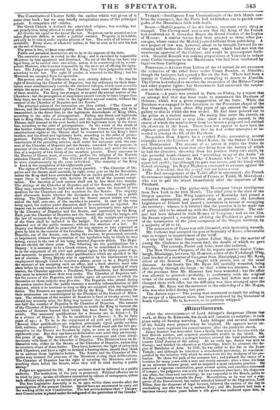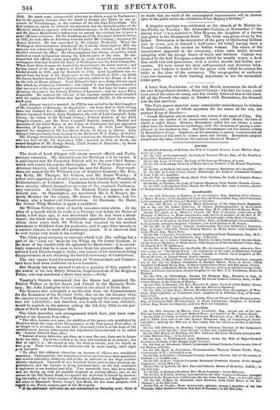_Miscellaneous.
After the announcement of Lord Abinger's dangerous illness last week, at Bury St. Edmunds, his death will occasion no surprise : it took place early on Sunday morning. Lady Abinger and several members of his family were present when he expired. He appears never en- tirely to have regained his consciousness after the paralytic shock. '
James Scarlett was descended from a family that went to Jamaica with tlus first British settlers, and acquired considerable wealth in the island. Me. William Anglin Scarlett, a younger brother, entered the legal profession, and became Chief Justice of the colony. At an early age, James was sent to Europe ; and finished his education at Cambridge where he attained the de- gree of Batchelor of Arts. In 1791, he was called to the bar in the Inner Temple ; and although he inherited a considerable patrimony, he was distin- guished by the industry with which he underwent the dry drudgery of his pro- fession. He chose the path of the common law ; and pursued the career of a barrister for many years with a sure and steady success: after a time, his fame as an advocate became great, and he acquired a most extensive practice. He possessed a vigorous constitution, great animal spirits, and excellent command of temper ; his judgment was acute, his law resources abundant ; his eloquence WU plain, but close and convincing; he was respectful to the Bench, polite to the Bar, conciliatory towards the Jury. Nevertheless, as he was not a sup- porter of the Government, but rather attached himself to the Opposition, Lord. Eldon, then the dispenser of legal favours, followed the custom of the day it overlooking one who was not a zealous Tory ; and Mr. Scarlett had been barrister twenty-three years before a silk gown was conferred upon bin, it. 1816. Be made some unsuccessful attempts to obtain a seat in Parliament ; but in the general election after the death of George the Third, be was re- turned for Peterborough, as the' nominee of the late Earl Fitza illiam. The fret subject to which he directed his attention was the financial policy of the Minister, which be opposed, with no marked success : to Sir Samuel Romilly's and Sir James Mackintosh's endeavours to amend the criminal law he gave a move efficient assistance. On the breaking-up of the Liverpool Administration, in 1827, be took office as Attorney-General under Mr. Canning ; becoming Sir James Scarlett. Be Was succeeded by Sir Charles Wetherell. When the Wellington Administration introduced the Catholic Emancipation Bill, the measure was vehemently opposed by Sir Charles ; who retired, and Sir James Scarlett resumed the office. He thus completed that change of politics ahich excited so much indignation among the Liberal party at the time. He dis- tinguished his official career principally by some successful prosecutions of aewspapers that had libelled the Duke of Wellington and the Lord Chancellor. When Lord Grey became the head of the Government, Sir James retired ; and having ceased to be the nominee of Earl Fitzwilliam, he was returned for Cockermouth in 18.31, and for Norwich in 1832. Lord Lyndhurst was re- moved from the bead of the Exchequer to the Woolsack in 1834; on which Sir James Scarlett became Chief Baron, and was called to the House of Peers by the title of Baron Abinger. Lord Abinger's fama as a Judge did not equal that which he attained as a barrister ; and indeed it was sometimes remarked that too much of the advocate's spirit remained. He had been for many years Attorney-General of the County Palatine of Lancaster ; and he was a Privy Councillor. He retained the full use of his vigorous faculties until attacked with the sudden and fatal illness that has terminated his life, in his seventy- sixth year. Lord Abinger was twice married. In 1792 he was united to the third daughter of Mr. Campbell, of Kilnaorey, in Argyleshire : the Lady died in 1829, having borne her husband five children, who all survive—namely, the Honourable Robert Campbell Scarlett; Lady Stratheden, the wife of Lord Campbell ; Lady Currey, the widow of Sir Edward Currey ; Colonel Scarlett, of the Filth Dragoon Guards ; and Mr. Peter Campbell Scarlett, formerly Marshal and Associate of the Chief Baron in the Court of Exchequer, but just appointed Secretary of Legation at the Court of Tuscany. la 1843, Lord Abinger married the daughter of Mr. Lee Steere Steere, of Jay es, in Surrey. Lady Abinger had previously been married to the Reverend H. J. Ridley, of Ockley. The Peerage descends to the late Lord's eldest son, the Member for Horsham ; who Was born on the 5th September 1794 : married, in 1824, to Sarah, the second daughter of Mr. George Smith, Chief Justice of Mauritius ; by whom he has two sons and two daughters.
The death of Lord Abinger will create several official and Parlia- mentary vacancies. Mr. Scarlett's seat for Horsham will be vacant. It
is understood that Sir Frederick Pollock will he the new Chief Baron ; which will vacate his seat for Huntingdon. Sir William Follett will be Attorney-General, which will vacate his seat for Exeter. Four candi- dates are named for Sir William's post of Solicitor-General—Mr. Fitz- roy Kelly, Mr. Thesiger, Mr. Godson, and Mr. Stuart Wortley : if either were appointed, it would vacate a seat for Cambridge, Woodstock, Kidderminster, or Yorkshire. Candidates have already been named, or have actually offered themselves for some of the expected Parliamen- tary vacancies. At Cambridge, Mr. Richard Foster appears on the Liberal side. At Huntingdon, are mentioned Mr. J. B. Rooper, for- merly Member for the county, Mr. James Rust, a banker, and Mr. Veasey, also a banker ; all Conservatives. At Horsham, Mr. Hurst, the former Whig Member, is again a candidate.
Sir William Follett's state of health occasions some alarm. At the close of a speech which he made in a Peerage case before the House of
Lords, a few days ago, it was discovered that he bad burst a blood- vessel ; the blood issuing in considerable quantities from his mouth. About three years back, Sir William was required by his medical attendants to withdraw from his profession, and to pass three months in a warmer climate, to ward off a pulmonary attack. It is observed that he now stoops very much in his carriage.
The Globe gives currency to rumours which look like nothing but a part of the "dead set "made by the Whigs on Sir James Graham, in the hour of his trouble with the agitators for Short-time : it is accord- ingly rumoured that he is soon to retire from his present office, and to succeed Lord Ellenborough in India ; one reason of his retirement being disappointment at not obtaining the Lord-L;eutenancy of Cumberland.
The two vacant Lord-Lieutenancies of Westmoreland and Cumber- land have both been conferred on Lord Lonsdale.
Her Majesty has been pleased to grant a gratuity of fifty pounds to the widow of the late Henry Solomon, Superintendent of the Brighton Police, who was murdered a short time since.—Globe.
Tuesday's Gazette announced that the Queen had appointed Mr. Patrick Walker to be her Agent and Consul in the Mosquito Terri- tory; Mr. John Lindegren to be Consul in the island of Porto Rico.
The Gazette also contained a notification from the Commissioners for the Reduction of the National Debt, that on the 5th January 1844, the surplus revenue of the United Kingdom beyond the actual expendi- ture was 1,443,3021.; and therefore one-fourth of that sum, 360,8251., would be applied, in the quarter ending the 5th July 1844, to the pur- chase of Stock and Exchequer Bills.
The Globe describes new arrangements which have just been corn- -filleted at the General Post-office.
"The office, known ever since the abolition of the penny-rate established by Dockwra about the close of the Protectorate, as the Two-penny Post-office, is no longer to be so called; the noble Earl (Lonsdale) who is at the bead of the establisbment having commanded this department heneeforeard to be called the London District Post-office.'
" Instead of seven deliveries per diem, as is now the case, there are in future to be ten daily. Up to two o'clock p. m. they will continue as at present ; the first at eight a. m, the second at ten, the third at twelve, and the fourth at two p.m. From two o'clock the deliveries will be made hourly, until eight p.m. inclusive. "To effect this elaborate alteration an increase of officers was considered necessary. Consequently, two inspectors of letter-carriers have been appointed, and several subsorters, stampers, and clerks, in addition to the large number
already employed. Upwards of one hundred letter-carriers have received ap- pointments, and the number ie being increased daily, as the full additional annplement is one hundred and fifty. Two tenements have also been taken,
sod are fitting up with all possible despatch as sorting-offices ; one at the corner of the Old Street Road, to expedite the deliveries of letters by shorten- ing the walks of the letter-carriers of Shoreditch,Dalsion, and Kingsland ; and the other in Sidmouth Street, Gray's Inn Road, for the same purpose, wRh regard to the North-western part of the Metropolis.
dill the additional deliveries are not commenced on Saturday next, there is
no doubt that the whole of the contemplated improvements will be thrown open to the public before the celebration of her Majesty's birthday."
A singular marriage was celebrated at the church of St. Martin-in- the-Fields, on Tuesday : Mr. Alexander Cadotte, or Nottenakm (" the strong wind '') was married to Miss Haynes, the daughter of a carver and gilder in the Hampstead Road. The bride was given away by her father. Nottenakm is the interpreter of the party of Ojibbeway Indians- now in town, and is himself a half-caste ; his father having been a French Canadian, his mother an Indian woman. The whole of his countrymen appeared at the ceremony, white satin bridal favours mingling with the savage finery of beads and feathers. Cadotte was dressed in the half European costume which he usually wears, a dark blue cloth vest and pantaloons, with a scarlet mantle and Indian mo- cassins. All were noted for their self-possessed and decorous beha- viour ; and Cadotte is lauded for the grace with which he saluted his bride at the close of the ceremony. The congregation or audience were less decorous in their bustling impatience to see the outlandish bridal party.
A letter from Stockholm. of the 22d March, announces the death of the late King's foster-brother, General Camps who had for many years been one of his aides-de-camp, and has closely followed him to the tomb. Of all the French who came to Sweden with Bernadotte, the General was the last survivor.
The Paris papers mention some remarkable coincidences in relation to Bernadotte; one of which accounts for the name of his son, the- present King of Sweden—. "Joseph Bonaparte and be married two sisters of the name of Clary. The former was the author of an unsuccessful novel, called Moine,' the hero of which is called Oscar. Madame Bernadotte called her son Oscar, a name- taken from the Scandinavian mythology, with the intention of paying a com- pliment to her brother-in-law. Another circumstance not less curious relates to Bernadotte's livery. Napoleon, on his accession to power, recommended all the dignitaries of his court to choose arms and liveries. Bernadotte adopted jonquil and sky-blue, which are the national colours of Sweden."



























 Previous page
Previous page